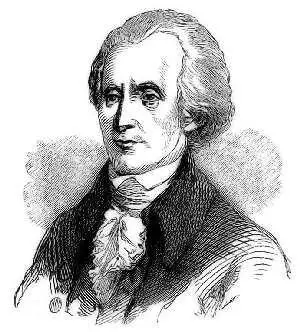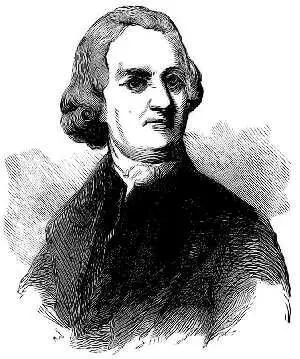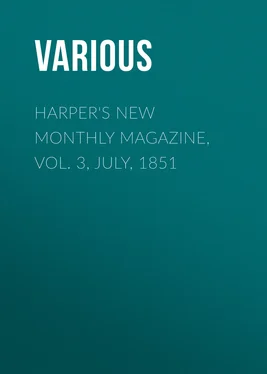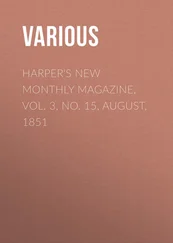Various - Harper's New Monthly Magazine, Vol. 3, July, 1851
Здесь есть возможность читать онлайн «Various - Harper's New Monthly Magazine, Vol. 3, July, 1851» — ознакомительный отрывок электронной книги совершенно бесплатно, а после прочтения отрывка купить полную версию. В некоторых случаях можно слушать аудио, скачать через торрент в формате fb2 и присутствует краткое содержание. Издательство: Иностранный паблик, Жанр: foreign_antique, periodic, foreign_edu, на английском языке. Описание произведения, (предисловие) а так же отзывы посетителей доступны на портале библиотеки ЛибКат.
- Название:Harper's New Monthly Magazine, Vol. 3, July, 1851
- Автор:
- Издательство:Иностранный паблик
- Жанр:
- Год:неизвестен
- ISBN:нет данных
- Рейтинг книги:3 / 5. Голосов: 1
-
Избранное:Добавить в избранное
- Отзывы:
-
Ваша оценка:
- 60
- 1
- 2
- 3
- 4
- 5
Harper's New Monthly Magazine, Vol. 3, July, 1851: краткое содержание, описание и аннотация
Предлагаем к чтению аннотацию, описание, краткое содержание или предисловие (зависит от того, что написал сам автор книги «Harper's New Monthly Magazine, Vol. 3, July, 1851»). Если вы не нашли необходимую информацию о книге — напишите в комментариях, мы постараемся отыскать её.
Harper's New Monthly Magazine, Vol. 3, July, 1851 — читать онлайн ознакомительный отрывок
Ниже представлен текст книги, разбитый по страницам. Система сохранения места последней прочитанной страницы, позволяет с удобством читать онлайн бесплатно книгу «Harper's New Monthly Magazine, Vol. 3, July, 1851», без необходимости каждый раз заново искать на чём Вы остановились. Поставьте закладку, и сможете в любой момент перейти на страницу, на которой закончили чтение.
Интервал:
Закладка:

RICHARD HENRY LEE.
We have seen that Virginia instructed her representatives in Congress to propose independence: she had a delegate equal to the task. In the midst of the doubt, and dread, and hesitation, which for twenty days had brooded over the National Assembly, Richard Henry Lee arose, and with his clear, musical voice read aloud the resolution, "That these United Colonies are, and of right ought to be, free and independent States; and that all political connection between us and the State of Great Britain is, and ought to be totally dissolved." John Adams immediately arose and seconded the resolution. To shield them from the royal ire, Congress directed the secretary to omit the names of its mover and seconder in the journals. The record says, "Certain resolutions respecting independence being moved and seconded, Resolved , That the consideration of them be deferred until to-morrow morning; and that the members be enjoined to attend punctually at ten o'clock, in order to take the same into their consideration."
The resolution was not taken up for consideration, until three days afterward, when it was resolved to "postpone its further consideration until the first day of July next; and in the mean while, that no time be lost, in case Congress agree thereto, that a committee be appointed to prepare a declaration to that effect." That committee was appointed on the eleventh of June, and consisted of Thomas Jefferson of Virginia, John Adams of Massachusetts, Benjamin Franklin of Pennsylvania, Roger Sherman of Connecticut, and Robert R. Livingston of New York. Mr. Lee would doubtless have been appointed the chairman of the committee, had not intelligence of the serious illness of his wife compelled him, the evening previous to its formation, to ask leave of absence. At the hour when the committee was formed, Mr. Lee was in Wilmington, on his way to Virginia. Mr. Jefferson, the youngest member of the committee, was chosen by his colleagues to write the Declaration, because of his known expertness with the pen; and in an upper chamber of the house of Mrs. Clymer, on the southwest corner of Seventh and High-streets, in Philadelphia, that ardent patriot drew up the great indictment against George the Third, for adjudication by a tribunal of the nations.
JOHN DICKENSON.
On the first of July, pursuant to agreement, Mr. Lee's resolution was taken up in the committee of the whole house, Benjamin Harrison of Virginia (father of the late President Harrison), in the chair. Jefferson's draft of a declaration of independence, bearing a few verbal alterations by Franklin and Adams, was reported at the same time, and for three consecutive days its paragraphs were debated, altered, and agreed to, one after another. No written record has transmitted to us the able arguments put forth on that occasion, and the world has lost all except a few reminiscences preserved by those who listened to, and participated in the debates. While all hearts were favorable to the measure, all minds were not convinced that the proper time had arrived for "passing the Rubicon." Among the opponents of the resolution was John Dickenson of Pennsylvania, whose powerful arguments in a series of Letters of a Pennsylvania Farmer , published eight years before, had contributed greatly toward arousing the colonies to resistance. He did not regard the measure as impolitic at all times , but as premature and impracticable at that time . He urged the want of money, munitions of war, of a well-organized and disciplined army; the seeming apathy of several colonies, manifested by their tardiness in declaring their wishes on the subject; the puissance of Great Britain by sea and land, and the yet unknown course of foreign governments during the contest which would follow. Richard Henry Lee, on the other hand, had supported his resolution with all his fervid eloquence, in Congress and out of it, from the day when he presented it. He prefaced his motion with a speech, which his compatriots spoke of in terms of highest eulogium. He reviewed with voluminous comprehensiveness the rights of the colonists, and the violation of those rights by the mother country. He stated their resources, descanted upon the advantages of union daily drawing closer and closer as external danger pressed upon them, and their capacity for defense. He appealed to the patriotism of his compeers, portrayed the beauties of liberty with her train of blessings of law, science, literature, arts, prosperity and glory; and concluded with these beautiful thoughts: "Why, then, sir, do we longer delay? Why still deliberate? Let this happy day give birth to an American Republic! Let her arise, not to devastate and conquer, but to re-establish the reign of peace and law. The eyes of Europe are fixed upon us; she demands of us a living example of freedom, that may exhibit a contrast, in the felicity of the citizen, to the ever-increasing tyranny which desolates her polluted shores. She invites us to prepare an asylum, where the unhappy may find solace, and the persecuted repose. She entreats us to cultivate a propitious soil, where that generous plant, which first sprung and grew in England, but is now withered by the blasts of Scottish tyranny [alluding to Bute, Lord Mansfield, and other Scotch advocates of the right of Great Britain to tax America], may revive and flourish, sheltering under its salubrious and interminable shade, all the unfortunate of the human race. If we are not this day wanting in our duty to our country, the names of the American legislators of '76 will be placed by posterity at the side of those of Theseus, of Lycurgus, of Romulus, of Numa, of the three Williams of Nassau, and of all those whose memory has been, and forever will be dear to virtuous men and good citizens."
EDWARD RUTLEDGE.
Edward Rutledge of South Carolina, the youngest member of Congress, being only twenty-five, was one of Mr. Lee's chief supporters, by his persevering industry, his charming conversation, and his impressive eloquence in debate. He was loved as a son by that stern and unyielding Puritan, Samuel Adams, then at the vigorous old age of fifty-four. He, too, with a voice that was never heard with inattention, supported the resolution; and indignantly rebuking what he was pleased to call a "temporizing spirit" among those who timidly opposed it, he exclaimed, "I should advise persisting in our struggle for liberty and independence, though it were revealed from Heaven that nine hundred and ninety-nine were to perish, and only one of a thousand were to survive, and retain his liberty! One such freeman must possess more virtue, and enjoy more happiness, than a thousand slaves; and let him propagate his like, and transmit to them, what he hath so nobly preserved." Such lofty sentiments possessed great potency at that perilous hour, when the stoutest heart was tremulous with emotion.

SAMUEL ADAMS.
Dr. Witherspoon, of the same ripe age as Mr. Adams, who had left the seat of learning at Princeton and the quiet pathways of a Christian shepherd, and took a seat in the national council, also urged, with all the power and pathos of his eloquence, delivered in broad Scotch accents, and marked by broad Scotch common sense, the immediate adoption of the resolution. While John Dickenson was eloquently pleading with his compeers, to postpone further action on the subject, and said "the people are not ripe for a declaration of independence," Doctor Witherspoon interrupted him and exclaimed, "Not ripe, sir! In my judgment we are not only ripe, but rotting. Almost every colony has dropped from its parent stem, and your own province, sir, needs no more sunshine to mature it!"
Читать дальшеИнтервал:
Закладка:
Похожие книги на «Harper's New Monthly Magazine, Vol. 3, July, 1851»
Представляем Вашему вниманию похожие книги на «Harper's New Monthly Magazine, Vol. 3, July, 1851» списком для выбора. Мы отобрали схожую по названию и смыслу литературу в надежде предоставить читателям больше вариантов отыскать новые, интересные, ещё непрочитанные произведения.
Обсуждение, отзывы о книге «Harper's New Monthly Magazine, Vol. 3, July, 1851» и просто собственные мнения читателей. Оставьте ваши комментарии, напишите, что Вы думаете о произведении, его смысле или главных героях. Укажите что конкретно понравилось, а что нет, и почему Вы так считаете.












